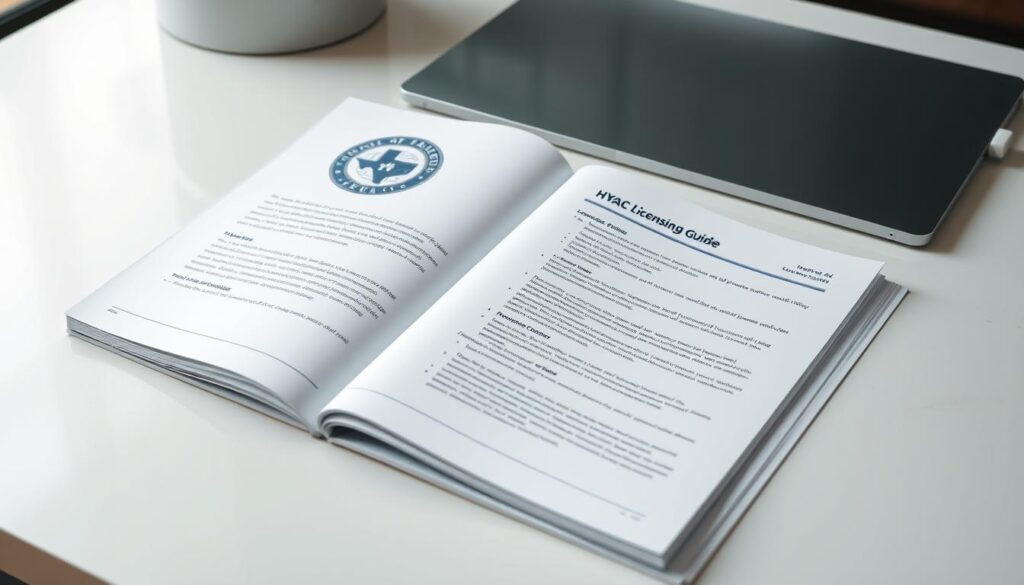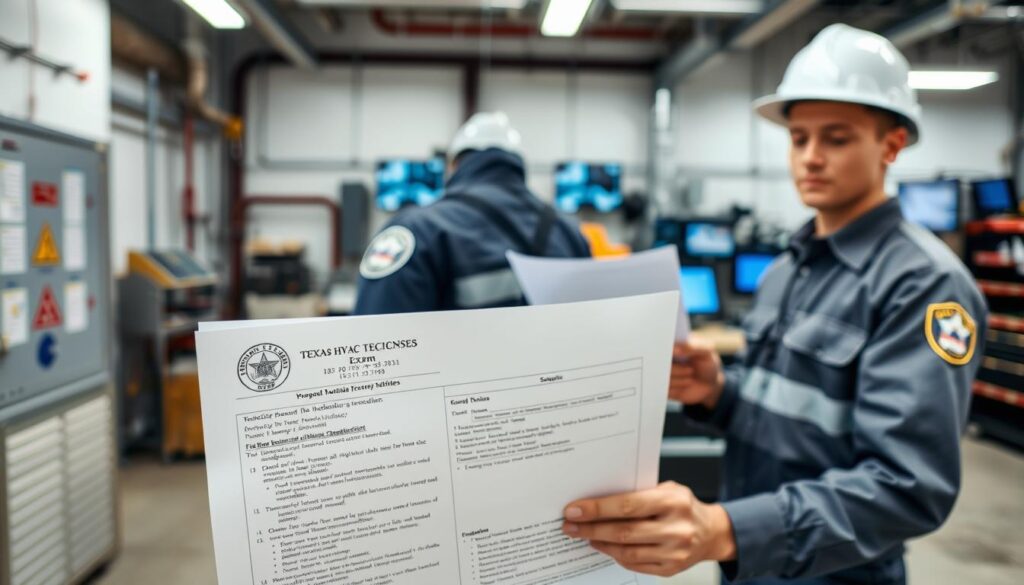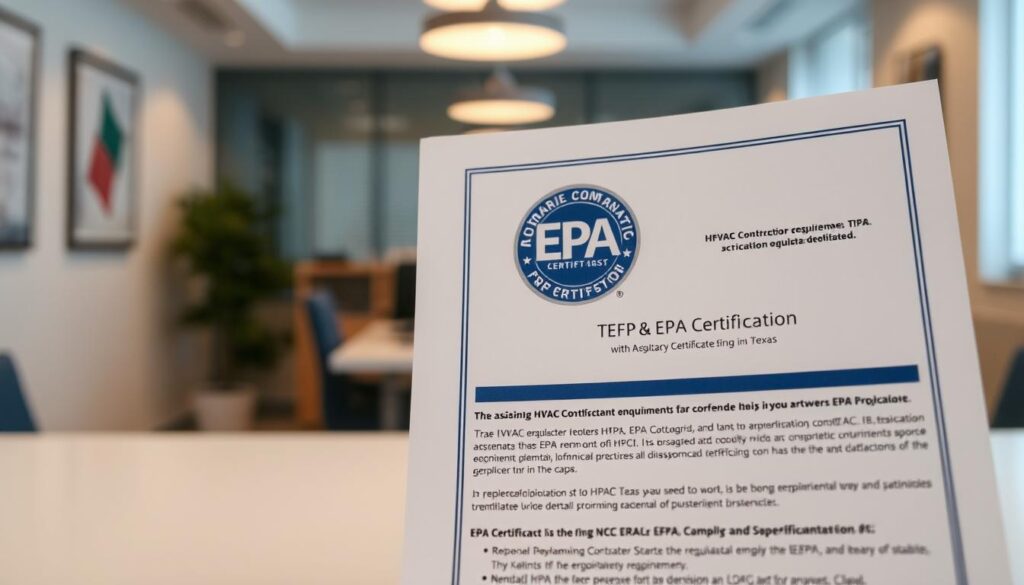Affiliate Disclosure
HVAC Guide Guys is a participant in the Amazon Services LLC Associates Program, an affiliate advertising program designed to provide a means for sites to earn advertising fees by advertising and linking to Amazon.
How to Obtain HVAC License in Texas? Are you ready to start a rewarding HVAC career in Texas? What steps do you need to take to turn your technical skills into a legal certification?

Getting a Texas HVAC contractor license might seem hard, but with the right help, you’re set. The Texas Department of Licensing & Regulation (TDLR) makes it clear how to get an HVAC license. They ensure that professionals are both skilled and safe.
Whether you’re an experienced technician or new to HVAC, knowing the licensing process is key. This guide will cover everything, from education to exam prep. It’s designed to help you reach your professional goals in Texas.
Key Takeaways
- Texas requires mandatory licensing for HVAC professionals
- TDLR oversees the entire licensing process
- Multiple license classes are available
- Comprehensive exams test technical knowledge
- Experience and educational requirements vary by license type
Table of Contents
Understanding HVAC Licensing Requirements in Texas
Getting an HVAC license in Texas means following specific rules from the Texas Department of Licensing & Regulation (TDLR). You’ll need to know the basics, like what licenses are available and the rules you must follow.
Age and Basic Prerequisites
Before you apply for a Texas air conditioning license, you must meet some basic requirements. These include:
- Minimum age of 18 years
- High school diploma or equivalent
- Clean criminal background
- Proof of relevant work experience
Types of Available Licenses
The Texas department of licensing hvac has two main license types:
| License Type | Work Scope | Unit Limitations |
|---|---|---|
| Class A License | Full HVAC system installation | No size restrictions |
| Class B License | Limited HVAC system work | Cooling: 25 tons and under Heating: 1.5 million BTUs/hour and under |
Regulatory Authority Overview
The Texas Department of Licensing & Regulation is in charge of HVAC professionals. They make sure all licensed contractors are skilled and professional in the HVAC field.
Choosing the right license depends on your career goals and the type of HVAC work you plan to pursue.
Explore Our HVAC Shop
Looking for top-rated HVAC tools, parts, and accessories? Visit our shop and find the perfect solution for your needs.
Visit the ShopExperience Requirements for Texas HVAC License
To get an hvac technician license in Texas, you must meet certain experience needs. The Texas licensing board has set clear rules. These rules help show that you have the skills needed to work as an air conditioning contractor.
You’ll need a lot of hands-on experience in HVAC before you can get licensed. The state has two main ways to meet these needs:
- 48 months of practical air-conditioning and refrigeration work under a licensed contractor within 72 months
- 12 months of technician certification plus 36 months of supervised practical experience within 48 months
It’s important to document your experience. You’ll need to fill out an Experience Verification Form. This form should show your work history, signed by your supervising licensed contractor.
| Experience Path | Total Experience | Supervision Requirement |
|---|---|---|
| Standard Path | 48 months | Within past 72 months |
| Certification Path | 12 months certification + 36 months work | Within past 48 months |
There are special rules for people with advanced education or military training in HVAC. These can help you meet the experience needs for a license.
Pro Tip: Document every aspect of your professional experience meticulously to streamline your license application process.
HVAC License Classes and Endorsements in Texas
Getting a HVAC contractor license in Texas can be tricky. It’s important to know about the different license classes and endorsements. These help you understand what kind of work you can do.
The state has two main license classes. Each has its own rules and work limits. Picking the right one depends on your career goals and the HVAC work you want to do.
Class A License Specifications
A Class A license is the top choice for HVAC contractors in Texas. It lets you work on any size and type of HVAC system.
- Covers all system sizes
- Provides maximum project flexibility
- Ideal for contractors seeking broad work opportunities
Class B License Details
The Class B license is for contractors who work on smaller projects. It has specific limits on the size of HVAC systems you can handle.
- Cooling systems limited to 25 tons
- Heating systems capped at 1.5 million BTUs/hour
- Suitable for residential and small commercial projects
Available Endorsement Options
Texas offers three special endorsements for HVAC licenses. You can only have one endorsement with your license. Choose wisely based on your skills.
| Endorsement | Specialty |
|---|---|
| Environmental Air Conditioning | Focused on eco-friendly cooling systems |
| Commercial Refrigeration | Specializing in large-scale refrigeration |
| Process Cooling or Heating | Industrial temperature control systems |
Your license class and endorsement decide what you can do, what exams you need, and your career path in HVAC.
Explore Our HVAC Shop
Looking for top-rated HVAC tools, parts, and accessories? Visit our shop and find the perfect solution for your needs.
Visit the ShopHow to Obtain HVAC License in Texas
Getting an HVAC license in Texas takes careful planning and hard work. You start by learning the key steps to become a licensed air conditioning technician.
The Texas air conditioning license application process has several important stages:
- Register as a technical trainee with the Texas Department of Licensing & Regulation (TDLR)
- Work under a licensed HVAC contractor to gain practical experience
- Accumulate required work hours and documentation
- Prepare for and pass the required licensing examination
- Submit your complete license application
Getting an HVAC license in Texas depends on the license class you choose. Each class has its own rules for experience, education, and exams.
| License Type | Experience Requirement | Exam Needed |
|---|---|---|
| HVAC Trainee | 0-24 months | None |
| Class B HVAC License | 24-48 months | ACR Contractor Exam |
| Class A HVAC License | 48+ months | Advanced ACR Contractor Exam |
To prepare for your Texas air conditioning license application, you need to document your work experience and training. You also must pass the required exam. Stay patient and focused to reach your professional goals.
Application Process and Required Documentation
Getting a Texas air conditioning license needs careful planning and preparation. The Texas Department of Licensing & Regulation (TDLR) has a clear process for HVAC professionals.
Before you start, you’ll need to collect important documents. You must also know the costs for your texas acr license and how to submit it.
Application Fee Structure
The licensing process requires a financial investment. Here are the main costs:
- Initial application fee: $115
- Background check processing fee: Varies
- Additional endorsement fees: May apply depending on license type
Experience Verification Requirements
Showing your work experience is key. You’ll need to fill out detailed forms that prove your skills:
- Get signed verification from licensed supervisors
- Provide detailed work history documents
- Make sure all forms are filled out correctly
Criminal Background Check Protocols
All applicants must pass a thorough background check. The steps include:
- Submitting fingerprints for state and federal checks
- Telling about any past crimes
- Review of past offenses by the licensing board
Pro Tip: Be open and detailed in your application to avoid delays or issues.
Make sure to prepare all documents well. Double-check your application for everything. And make sure you meet all the requirements before you submit it.
Explore Our HVAC Shop
Looking for top-rated HVAC tools, parts, and accessories? Visit our shop and find the perfect solution for your needs.
Visit the ShopTexas HVAC Licensing Exam Information

To get your hvac technician license in Texas, you must pass a tough exam. This exam is key to show you know your stuff in HVAC.
The exam changes based on the type of license you want. If you’re aiming for different licenses, the exam will be different too:
- Class A License Exam:
- 120 total questions
- Four-hour time limit
- Covers all HVAC system knowledge
- Class B License Exam:
- 100 total questions
- Three-hour time limit
- Deals with specific HVAC topics
Passing Score: You need at least 70% to pass the exam.
The exam covers important areas like:
- HVAC system design and installation
- Heating and cooling basics
- Refrigeration systems
- Equipment details
- Texas laws and business rules
“Getting ready for the Texas HVAC licensing exam is crucial. Spend time studying and getting to know the material well.”
Future HVAC pros should look into prep courses, study guides, and practice tests. Knowing both technical and legal stuff is key to showing you’re an expert.
Insurance Requirements for Licensed HVAC Contractors
Getting your texas hvac contractor license requires understanding insurance rules. HVAC pros need to know the insurance rules set by Texas to work legally.
For air conditioning contractor registration in Texas, you must get commercial general liability insurance. It must meet certain coverage standards.
Coverage Minimums by License Class
Insurance needs change with your license class. Here’s what you need to know:
| License Class | Per Occurrence Coverage | Aggregate Coverage |
|---|---|---|
| Class A License | $300,000 | $600,000 |
| Class B License | $100,000 | $200,000 |
Certificate of Insurance Submission
After getting your insurance, you must send a Certificate of Insurance to the Texas Department of Licensing & Regulation. Your document should have:
- Your full legal name
- Registered business name
- Detailed coverage amounts
- Proof of insurance from a Texas-authorized provider
Pro tip: Keep your insurance up to date to follow state rules.
Explore Our HVAC Shop
Looking for top-rated HVAC tools, parts, and accessories? Visit our shop and find the perfect solution for your needs.
Visit the ShopEPA Certification and Additional Requirements

Getting your hvac certification in Texas means you must know about EPA rules. The Environmental Protection Agency (EPA) has strict rules for HVAC techs who work with refrigerants. These rules are key to getting your license in Texas.
The EPA 608 Certification is a must for HVAC pros who handle refrigerants. It makes sure you can work with refrigerants safely and protect the environment.
EPA Certification Types
- Type I: Small appliance refrigeration
- Type II: High-pressure appliance systems
- Type III: Low-pressure appliance systems
- Universal: Comprehensive coverage across all refrigeration types
Most HVAC contractors in Texas get the Universal certification. It gives you the most flexibility in your career. To get this, you must pass a big exam on:
- Ozone depletion prevention
- Clean Air Act regulations
- Refrigeration principles
- Safe recovery techniques
After meeting EPA needs, many techs get more certifications. They might get them from North American Technical Excellence (NATE) or the American Society of Heating, Refrigeration and Air-Conditioning Engineers (ASHRAE). These extra certifications boost their skills.
Career Outlook and Salary Expectations
Thinking about getting an hvac technician license in Texas? You’re stepping into a field with lots of growth. The Texas HVAC job market is booming, with many chances for skilled workers.
The HVAC job scene in Texas is very promising. The state’s big construction industry and growing population mean there’s always a need for skilled HVAC techs.
| Career Metric | Texas HVAC Statistics |
|---|---|
| Total HVAC Professionals | 31,910 |
| Annual Mean Salary | $54,640 |
| Projected Job Growth | 17% |
Looking into the requirements for a Texas HVAC contractor license? You’ll find many benefits:
- Competitive salary potential
- Strong job market stability
- Opportunities for specialization
- Potential for career advancement
Salaries can change based on a few things:
- Experience level
- Where you are in Texas
- Specific technical skills
- Additional certifications
Pro Tip: Cities like Houston, Dallas, and Austin usually pay more. This is because they have more demand and complex jobs.
The HVAC industry in Texas is a dynamic and rewarding career for those who invest in their skills.
Explore Our HVAC Shop
Looking for top-rated HVAC tools, parts, and accessories? Visit our shop and find the perfect solution for your needs.
Visit the ShopTraining Programs and Educational Resources
Getting your hvac certification in Texas needs careful planning. The state has many training programs to help you meet your requirements. Whether you’re starting or want to grow in your career, there are paths for you.
Key educational resources for HVAC professionals include:
- Community college technical programs
- Vocational training institutes
- Accredited HVAC certification courses
- Online and in-person training options
When picking an HVAC training program, think about these important points:
- Program accreditation by recognized industry organizations
- Comprehensive curriculum covering technical skills
- Hands-on training opportunities
- Job placement assistance
Top Texas schools for HVAC education are:
| Institution | Location | Program Type |
|---|---|---|
| Austin Community College | Austin | Technical Certificate |
| Houston Trade Training | Houston | Professional Certification |
| Southern Careers Institute | Corpus Christi | Associate Degree Program |
Your chosen program should meet current industry standards. It should cover system design, installation, maintenance, and repair. Many programs are flexible, so you can study while working.
Investing in quality HVAC education is your first step toward a successful career in Texas’s thriving heating and cooling industry.
Conclusion
Getting an HVAC license in Texas is a smart career choice. It involves several important steps, like getting work experience and passing exams. Your hard work in learning will make you stand out in this field.
The rules for getting a Texas HVAC contractor license are strict. They make sure you offer top-notch service and follow safety rules. This process helps both professionals and customers get reliable HVAC services in Texas.
It’s important to keep your license up to date. Texas requires eight hours of continuing education before you can renew it. This includes one hour on specific topics. Staying current with new technologies and safety rules will improve your skills and make you more attractive to employers.
Being a licensed HVAC professional in Texas is rewarding. You’ll find good job opportunities, fair pay, and chances to grow your business. Keep striving for excellence and learning new things. Your HVAC career will flourish in Texas.

